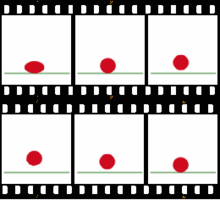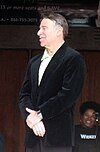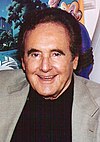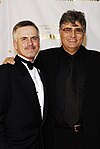
| Main | Categories and topics | Tasks and projects |
Introduction
Animation is a filmmaking technique by which still images are manipulated to create moving images. In traditional animation, images are drawn or painted by hand on transparent celluloid sheets (cels) to be photographed and exhibited on film. Animation has been recognized as an artistic medium, specifically within the entertainment industry. Many animations are computer animations made with computer-generated imagery (CGI). Stop motion animation, in particular claymation, has continued to exist alongside these other forms.
Animation is contrasted with live-action film, although the two do not exist in isolation. Many moviemakers have produced films that are a hybrid of the two. As CGI increasingly approximates photographic imagery, filmmakers can easily composite 3D animations into their film rather than using practical effects for showy visual effects (VFX). (Full article...)
Selected article
The Prince of Egypt is a 1998 American animated musical film and the first traditionally animated film produced and released by DreamWorks Animation. The film is an adaptation of the Book of Exodus and follows the life of Moses and from being prince of Egypt to his ultimate destiny to lead the Hebrew slaves out of Egypt. The film was directed by Brenda Chapman, Simon Wells and Steve Hickner. The film featured songs written by Stephen Schwartz (pictured) and a score composed by Hans Zimmer. The voice cast featured a number of major Hollywood actors in the speaking roles, while professional singers replaced them for the songs. The exceptions were Michelle Pfeiffer, Ralph Fiennes, Ofra Haza, Steve Martin, and Martin Short, who sang their own parts. The film went on to gross $218,613,188 worldwide in theaters, making it the second traditionally animated feature not released by Disney to gross over $100 million in the U.S. after The Rugrats Movie. The film also remained the highest grossing non-Disney traditionally animated film until 2007, when it was out-grossed by The Simpsons Movie.
Selected image

Did you know (auto-generated) -

- ... that the stylized animation of Teenage Mutant Ninja Turtles: Mutant Mayhem was inspired by rough sketches in school notebooks?
- ... that the live-action comedy series Community had a stop motion animated Christmas special?
- ... that although Blizzard's franchise Overwatch is centered around video games, its lore is mainly told through animated shorts, comics, and novels?
- ... that Bruce Timm created most of the character designs for Batman: The Animated Series?
- ... that the interactive cartoon Cat Burglar takes about 15 minutes to watch, but features 90 minutes of animation?
- ... that the 1937 Fleischer Studios strike in New York City was the first major labor strike in the animation industry?
Selected quote
Selected biography
Joseph Roland "Joe" Barbera (March 24, 1911 – December 18, 2006) was an influential American animator, film director, film producer, storyboard artist, and cartoon artist. Born in New York City, after working odd jobs and as a banker, Barbera joined Van Beuren Studios in 1932 and subsequently Terrytoons in 1936. He met his lifelong collaborator William Hanna while working for Metro-Goldwyn-Mayer in 1937 and soon began producing animated shorts such as the Tom and Jerry series. In 1957, after MGM dissolved their animation department, they co-founded Hanna-Barbera, which became the most successful television animation studio in the business, producing programs such as The Flintstones, The Huckleberry Hound Show, Top Cat, The Jetsons, Scooby-Doo, The Quick Draw McGraw Show, The Smurfs, Wacky Races and Yogi Bear. Hanna and Barbera won seven Academy Awards and eight Emmy Awards. Their shows, which have translations in more than 20 languages, had a global audience in the 1960s of over 300 million people.
Selected list
The Annie Award for Best Animated Home Entertainment Production is awarded annually by ASIFA-Hollywood, a non-profit organization that honors contributions to animation, to the best animated direct-to-video film of the year. It is one of the Annie Awards, which honor contributions to animation, including but not limited to producers, directors, and voice actors. The Annie Award for Best Animated Home Entertainment Production was created in 1995, and has been awarded yearly since. It was originally known as the Annie Award for Best Animated Video Production; the name of the award was changed in 1997 to the Annie Award for Best Home Video Production, was changed again in 1998 to the Annie Award for Outstanding Achievement in an Animated Home Video Production, and was changed in 2002 to the current name. To be eligible for the award, the film must have been released in the year before the next Annie Awards ceremony, and the developers of the game must send a five minute sample DVD of the film to a committee appointed by the Board of Directors of ASIFA-Hollywood.
More did you know...
- ...that the Socialite application of the NECA Project allowed "face to face", emotion-based interactions between animated agents on the internet?
- ...that "You Debt Your Life" was the second American Dad! episode to feature the story of how Roger the Alien saved Stan Smith at Area 51, the first episode having been "Roger Codger"?
- ...that the Animation Council of the Philippines, Inc. sponsors a yearly festival that features the works of Filipino animators?
Anniversaries for July 15
- Films released
- 1923 – Felix in Hollywood (United States)
- 1924 – Felix Brings Home the Bacon (United States)
- 1938 – Popeye the Sailor with the Jeep (United States)
- 1939 – Dangerous Dan McFoo (United States)
- 1939 – Porky's Picnic (United States)
- 1944 – Brother Brat (United States)
- 1961 – The Rebel Without Claws (United States)
- 2011 – Winnie the Pooh (Walt Disney Pictures, United States)
- Television series and specials
- 2012 – Black Dynamite, an American animated television series begins airing on Adult Swim
Subportals
Related portals
Wikimedia
The following Wikimedia Foundation sister projects provide more on this subject:
-
Commons
Free media repository -
Wikibooks
Free textbooks and manuals -
Wikidata
Free knowledge base -
Wikinews
Free-content news -
Wikiquote
Collection of quotations -
Wikisource
Free-content library -
Wikiversity
Free learning tools -
Wiktionary
Dictionary and thesaurus























